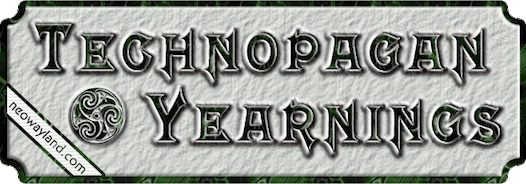How we treat the Other
❝The trust we share among ourselves and how we use that trust is really what defines our community. I've said that how we treat the Other may be the defining characteristic of a great human civilization. I stand by that.❞— NeoWayland, Characters
Related to who?
Sorry about that. I wasn't going to load the new stuff until I had all the changes made.
Read More...NeoNote — This tragedy does not reflect on Heathens.
“In which John compares and contrasts Greek civilization and the Persian Empire. Of course we're glad that Greek civilization spawned modern western civilization, right? Maybe not. From Socrates and Plato to Darius and Xerxes, John explains two of the great powers of the ancient world, all WITHOUT the use of footage from 300.”
Read More...❝A thing is right…❞
“A thing is right when it tends to preserve the integrity, stability and beauty of the biotic community. It is wrong when it tends otherwise.”
❝Conservation is getting nowhere…❞
“In which John presents Mesopotamia, and the early civilizations that arose around the Fertile Crescent. Topics covered include the birth of territorial kingdoms, empires, Neo-Assyrian torture tactics, sacred marriages, ancient labor practices, the world's first law code, and the great failed romance of John's undergrad years.”
Read More...On that Pagan community thing
Okay, rain break over
Building
“In which Mike Rugnetta continues our unit on pantheons with the complex Indian pantheon, focusing on stories that were written in Sanskrit. We start with a violent creation story. We talk about the concept of Brahman, and the personification as three deities: Brahma, Vishnu, and Shiva. Then, the goddess Durga teaches us how to behead a buffalo demon while riding a lion.”
Read More...How easy it is to join
❝See, the internet is an equalizer of sorts. If I am in a "community," my statements have the same weight as the flakiest member who joined just last week. The chances of anyone sticking around and making that community actually worth something is inversely proportional to how easy it is to join.❞— NeoWayland, Flake off
Flake off
❝It always worries me when I can hear the capitals in what other people say, even if it is only what they are typing on a computer screen.❞— NeoWayland, "Here I come to save the Day"
Observing what others think of “Pagan Community”
Communities
Solitary
❝Do I think I can change the universe? I already have. Can I make it better? Maybe.❞
— NeoWayland
Characters
Community and being a Proper Pagan
Terms of understanding
This is a page from the third version of Technopagan Yearnings. There are some formatting differences. Originally published at www.neowayland.com/C410060794/E20091226123859
I know what to call Book People now
Anyway, some things did go right. Early this morning while thinking about what may become chapter five, I solved a nagging problem that has been bothering me for months.
So working from "The story is not the journey," I've settled on terms.
You see, almost every word I used to describe the book people sounded pejorative. The one I've settled on isn't perfect, but it's a lot better. Here's what I'm using.
Sojourner - experienced faith, active, focused on their own journey.
Wonderer (not Wanderer) - Seeking, but no clear direction or method. "They hear the call, but they haven't found their path yet.
And finally…
Pilgrim - revealed faith, "the answers could be in the very next book." The fable happens to them as they seek to manifest the story in their own lives.
And no, this isn't necessarily about religion or faith.
This also has application to the profile notes I talked about before. I added the descriptions to =profile5 - special interests to use as I need.
Hmm, while I'm "in the neighborhood," I'd like to make another point. I have the same thing for Religion, Clubs or volunteer efforts, Politics, and Community. Let's look at one.
Clubs or volunteer efforts? -
Official? - Active? -
How? - Importance to person? -
Obviously I copy/paste as need. But what the heck do I mean by "official" and "active?"
Official is what they call themselves. "I'm a Rotarian" (there aren't as many as there used to be). Active is how much they put into it. It's the difference between a benchwarmer who is there for the social stuff and the one who stays late to help clean up. For some, the label is the most important part. Others may not even be "official" but they're more than willing to pitch in.







